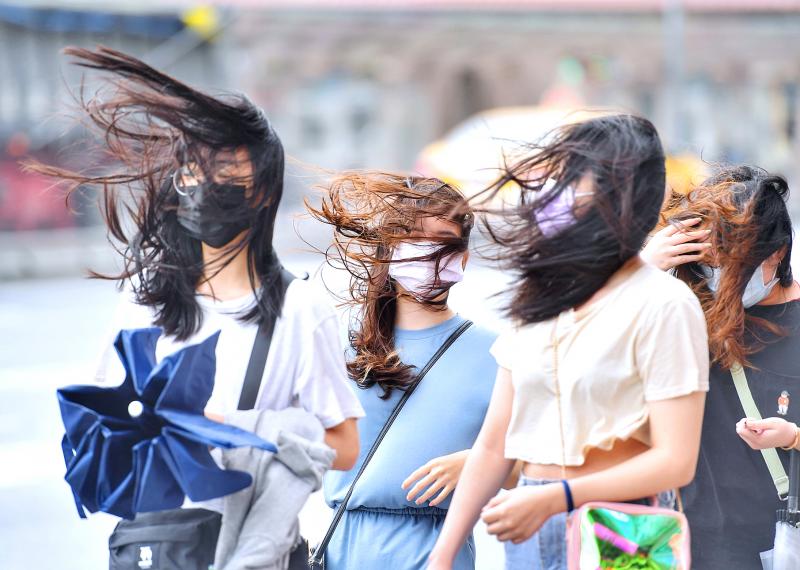Three to four tropical storms or typhoons are expected to hit Taiwan this year due to a weak La Nina effect in the northwest Pacific Ocean, the Central Weather Bureau (CWB) said yesterday, as typhoon season begins next month.
Taiwan’s typhoon season generally lasts from July to September, with most typhoons occurring in August.
Weather Forecast Center Director Lu Kuo-chen (呂國臣) told a news conference that a weakening La Nina is expected to have less of an effect on Taiwan.

Photo: CNA
“The climate simulation we conducted, and those conducted by other meteorological agencies around the world, showed that the number of typhoons that form in the northwest Pacific Ocean this year and the number of typhoons that would directly affect Taiwan are likely to fall within a normal range,” Lu said.
The average temperature over the next three months is expected to be normal to slightly warmer than usual, while rainfall is likely to be about the same as the average for this climate, he said.
On average, 20 to 25 tropical storms or typhoons are expected to occur in the northwest Pacific between now and December, three to four of which are forecast to affect Taiwan directly.
Only two tropical storms have so far formed in the northwest Pacific, fewer than the average of 4.3 for this climate, Lu said.
In a La Nina year, tropical storms or typhoons are likely to form close to Taiwan, Lu said.
“Once typhoons form off the east coast of the Philippines, they move toward Taiwan, or turn north toward Japan or Korea,” he said. “Because the typhoons travel a shorter distance before reaching shore, their intensity is likely to be normal.”
Two tropical systems are developing south of Taiwan, CWB senior weather forecaster Wu Wan-hua (伍婉華) said.
A low pressure system is lingering east of the Philippines, where tropical systems tend to develop, he said.
Another tropical disturbance in the South China Sea has become strong and is forecast to move northwest toward Hong Kong, while meteorological agencies in other countries have yet to agree on how the tropical system that is east of the Philippines will develop, Wu said.
“We will need to monitor the development of these two systems to determine how they will affect Taiwan,” she said. “There might be a Fujiwara effect if they are about 1,000km apart and comparable in strength, but it is still too early to tell.”
The tropical system in the South China Sea might be upgraded to Tropical Storm Chaba tomorrow, the bureau said, adding that from today, there would be a southeasterly wind bringing intervals of rain in its path.
As the low pressure system approaches the south of Taiwan on Friday, rain is expected on the east coast all that day, and in southern Taiwan and on outlying islands over the weekend, Wu said.
People in southeastern Taiwan and on the Hengchun Peninsula (恆春半島) should watch out for short bursts of intense rain, while people in northern and central Taiwan should brace for strong afternoon thundershowers, she said.

The US government has signed defense cooperation agreements with Japan and the Philippines to boost the deterrence capabilities of countries in the first island chain, a report by the National Security Bureau (NSB) showed. The main countries on the first island chain include the two nations and Taiwan. The bureau is to present the report at a meeting of the legislature’s Foreign Affairs and National Defense Committee tomorrow. The US military has deployed Typhon missile systems to Japan’s Yamaguchi Prefecture and Zambales province in the Philippines during their joint military exercises. It has also installed NMESIS anti-ship systems in Japan’s Okinawa

TRAGEDY STRIKES TAIPEI: The suspect died after falling off a building after he threw smoke grenades into Taipei Main Station and went on a killing spree in Zhongshan A 27-year-old suspect allegedly threw smoke grenades in Taipei Main Station and then proceeded to Zhongshan MRT Station in a random killing spree that resulted in the death of the suspect and two other civilians, and seven injured, including one in critical condition, as of press time last night. The suspect, identified as a man surnamed Chang Wen (張文), allegedly began the attack at Taipei Main Station, the Taipei Fire Department said, adding that it received a report at 5:24pm that smoke grenades had been thrown in the station. One man in his 50s was rushed to hospital after a cardiac arrest

PUBLIC SAFETY: The premier said that security would be tightened in transport hubs, while President Lai commended the public for their bravery The government is to deploy more police, including rapid response units, in crowded public areas to ensure a swift response to any threats, President William Lai (賴清德) said yesterday after a knife attack killed three people and injured 11 in Taipei the previous day. Lai made the remarks following a briefing by the National Police Agency on the progress of the investigation, saying that the attack underscored the importance of cooperation in public security between the central and local governments. The attack unfolded in the early evening on Friday around Taipei Main Station’s M7 exit and later near the Taipei MRT’s Zhongshan

ON ALERT: Taiwan’s partners would issue warnings if China attempted to use Interpol to target Taiwanese, and the global body has mechanisms to prevent it, an official said China has stationed two to four people specializing in Taiwan affairs at its embassies in several democratic countries to monitor and harass Taiwanese, actions that the host nations would not tolerate, National Security Bureau (NSB) Director-General Tsai Ming-yen (蔡明彥) said yesterday. Tsai made the comments at a meeting of the legislature’s Foreign Affairs and National Defense Committee, which asked him and Minister of National Defense Wellington Koo (顧立雄) to report on potential conflicts in the Taiwan Strait and military preparedness. Democratic Progressive Party (DPP) Legislator Michelle Lin (林楚茵) expressed concern that Beijing has posted personnel from China’s Taiwan Affairs Office to its